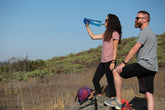You may be aware of the common symptoms of dehydration such as dry mouth, headaches and dizziness but did you know that 25% of heat-related illness cases are caused by fluid imbalance? Water keeps your body temperature regulated which is why you should always stay hydrated when venturing out, particularly in warmer weather. It is also important to note that, even if you are not thirsty, you should keep a container of water with you to sip on. Otherwise, you may begin to notice the impact of dehydration on your body, particularly on your senses.
Sense of Smell
Should your sense of smell be impaired, you may not be able to enjoy the scents of the trees, fresh flowers or even the scents in your home. However, having an impaired sense of smell also means you may fail to detect danger, such as the smell of fire or the smell or food which is not safe to eat. If you are partial to venturing out for a hike or long walk, be careful not to eat any unfamiliar food or food which can expire quickly as studies have shown that thirsty people tend to have a reduced disgust response to bad odors. Some people experience a permanent bad smell in their noses making them unable to distinguish bad odors from good ones.
Effects on Taste
Taste and smell are closely linked. You are more likely to smell when food is no longer safe to eat before you taste it. Smell also helps you to tell the difference between certain foods. When dehydrated, you may notice your mouth becoming dry as an initial symptom. However, as time passes and thirst is not satiated, your saliva may begin to taste salty. This is due to an imbalance of salt and water in your body. There may also be an increase in acid reflux which may lead to a bitter taste in the mouth. Impairment in the sense of smell and taste can lead to ingesting foods which are not safe.
Keep your reusable container filled with water and sip it throughout the day to help avoid symptoms like these.
How Sight is Affected
When dehydrated, the eyes may stop producing tears. This can lead to vision strain, reduced sight, blurriness and dry eye. Conjunctivitis and other eye infections may occur if water is not frequently ingested as tears wash away foreign objects in the eye. Many senior people ‘forget’ to drink or eat as their body does not trigger the feelings of thirst and hunger as it once did. Therefore, it is a good idea to keep a reusable container in the fridge of any elderly relatives to remind them to stay hydrated.
Take your environmentally friendly container of water with you on hikes, long drives or excursions as it could be a life-saver. Try to find somewhere you can refill if needed before going any further and always drink water before leaving for a long walk in the summer to avoid heat related illness.



